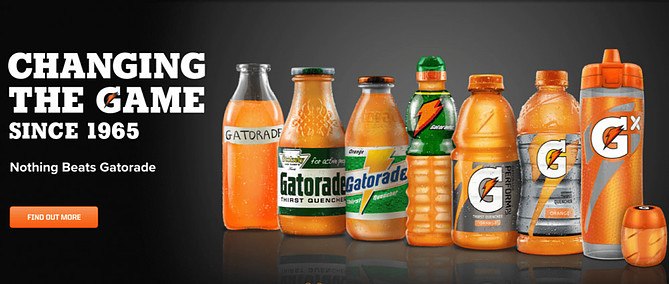In this article, we will be digging into the Gatorade to find out how it affects migraines and headaches. Most importantly, does Gatorade help with headaches or migraine?
Regardless when you go see the doctor, or you are rush to a clinic for a severe migraine attack, one of the first things the nurse does is to hook you up to a drip. Do you know what is in the drip? Salt in purified water! Sometimes sugar, electrolytes or vitamins may be added to it too
But, why? You may ask. This is because the most common cause of headache and migraine is dehydration.
Dehydration result not only from lost or inadequate intake of water but also lost or inadequate electrolyte in the body, so taking only water is not enough. So, you can prevent being rushed to an emergency room for a migraine attack, which is as a result of dehydration by drinking Gatorade which main contains is salt, water and sugar.
The Gatorade is manufactured not as a cure for migraine but as a rehydrating sports drink for athletes or individuals who are dehydrated or having a headache or migraine as a result of dehydration.
In other words, Gatorade helps to prevent or relieve headaches and migraines caused by dehydration.
Before anything, let’s identify what Gatorade really is.
What is Gatorade?
Gatorade is a brand of non-carbonated sports drink that was developed with the aim of rehydrating and replenishing fluids, carbohydrates, and electrolytes lost from sweat during a vigorous exercise. It was first developed by a team of scientists led by Robert Cade in 1965 and named after “Gators” of the University of Florida football team, which it was originally made for.
The drink helped to replenish the water and electrolyte lost in sweat and the carbohydrates the student-athletes burned during sports activities.
Gatorade was initially produced and advertised by Stokely-Van Camp following its inception in 165. In 1983, the brand was acquired by the Quaker Oats Company which, in turn, was re-sold the brand to the PepsiCo in 2000.
It competes with similar products such as Powerade, Vitaminwater and Lucozade.
Tip: Do you think Himalayan Salt can cause migraines?
What’s in Gatorade? – The Content
Gatorade comes in different varieties and flavors. Therefore, the content of this drink slightly varies according to the flavor and how it was sweetened.
The main ingredients in Gatorade are water, dextrose, citric acid, and electrolytes — sodium and potassium.
The following are the different varieties of Gatorade drinks, their flavours and content.
1. Gatorade Thirst Quencher
The Thirst Quencher comes in fruit, berry, punch, orange and lemon-lime flavours.
Its main content is water, dextrose, sugar, salt, sodium citrate, citric acid, flavoring and monopotassium phosphate. It also contains other ingredients like Yellow 5, Yellow 6, Red 40, and Blue 1, which give the drinks its colors, meanwhile, each flavors have additional content.
For instance, Fruit Punch contains corn starch and glycerol ester of rosin in addition to the above-mentioned content.
2. G2
The G2 is available in grape, orange and fruit punch flavors.
The common ingredients of it are water, sugar, salt, citric acid, sodium citrate, flavoring, monopotassium phosphate, and low calories sweeteners— sucralose and acesulfame potassium.
Red 40, Blue 1 and Yellow 5 are the colouring agents that give each flavor its color.
3. Gatorade Prime
The Prime is designed for athletes to drink before starting their exercising or competing. Available in orange and grape flavors.
It contains water, sugar, dextrose, maltodextrin, isomaltulose citric acid, salt, monopotassium phosphate, calcium pantothenate, niacinamide, xanthan gum, flavoring and either Yellow 5 or Red 40 coloring.
4. Gatorade Recover
The Recover is designed to help the body recover after exercise. It contains protein and carbohydrates. It comes in mixed berry and tropical orange flavors.
It contains, water, whey protein, collagen, dextrose, sugar, sodium bisulphate salt, flavoring, maltodextrin, phosphoric acid, citric acid, sucralose acesulfame, potassium with either Red 40 and Yellow 5 color.
Other varieties include:
5. Gatorade Fierce
6. Gatorade Flow
7. Gatorade Frost
8. Gatorade Juiced
9. Gatorade Organic
10. Gatorade Zero
Tip: This is Why Glaceau Vitamin Water Zero is Not a Healthy Option, especially if you have diabetes. Just Watch the Video.
When Should You Drink Gatorade?
You can take Gatorade to rehydrate when;
- You are exercising under high temperature and sweating a lot more, especially if you notice salt on your skin.
- You are carrying out or just finished an endurance exercise, like a marathon.
- You need more energy during a long workout
- After a workout or endurance exercise, and you quickly need simple carbs to keep from feeling dizzy.
- You drink too much water, and you are experiencing ‘water intoxication’ or ‘water poisoning’.
Drinking too much water to rehydrate during sports or intense training can easily result in water intoxication because you lose too many electrolytes from the body as you sweat during those activities. And, drinking only water can dilute the sodium in your blood reducing your blood sodium levels and cause too much fluid to enter your cells which will make the cells to swell. This can result in serious health consequences like
- confusion,
- drowsiness,
- muscle cramps,
- increase blood pressure,
- having difficulty in breathing, and
- double vision.
A drinking sports drink can help you to replenish the lost electrolyte resulting in body fluid balance.
Does Gatorade Help With Headaches or Migraine?
With all the home remedies available for migraine, most people want to know if drinking Gatorade is one of the home remedies. For migraines, can drinking Gatorade actually relieve headache and cure migraine?
Most of us are always too busy that we don’t even remember to drink enough water to keep us hydrated. Insufficient water intake may even result in dehydration. Dehydration, especially during the hot season, is one of the most common causes of headache and migraine, it is a way of our body telling us that it urgently needs more fluid and electrolyte to balance its PH. In this case, drinking Gatorade can possibly help with your headache and migraine, if dehydration is the trigger, by fixing the cause.
How Gatorade Help With Headaches?
A lot of things that can trigger headaches, and one of them is dehydration, or a lack of necessary fluid and electrolytes in your body. When a person water intake is insufficient or when one engages in an intense workout or exercise that results in a lot of sweating, it may result in dehydration which can cause a headache.
Drinking Gatorade resolves the cause of the headache, since it contains water and electrolytes that the body needs to replenish the fluids and electrolyte we lost from sweating, thereby eliminating the headache.
So, if you are feeling dehydrated or having a headache that you feel is a result of dehydration, drink 16 oz of Gatorade. After the initial 16 oz, continue to sip another Gatorade until you notice that the headache has subsided. The effect usually takes about an hour.
Does Gatorade Cure Migraine?
Gatorade helps to prevent migraine or make the migraine to gradually go away. If you want to know how all this is possible?
This is how—
- Glucose
Gatorade contains a lot of sugar. You may be wondering if sugar can help with headache, but the answer is yes and no.
Yes, if low blood sugar is what triggered the migraines. But since too much of sugar can result in sugar problems, use this as a temporary fix.
- Electrolytes—Sodium & Potassium
The main purpose why Gatorade was produced is for hydration and to replenish lost water and electricity with sodium and potassium. That is to prevent one of the most common causes of migraine, which is dehydration.
Could Gatorade Cause Migraines?
Gatorade like most artificially flavored foods or drinks is suspected (but not proven) to contain MSG. Many believe that MSG (Monosodium Glutamate) can trigger migraine attacks while others doubt it.
So, it may be possible that some people could experience migraines after drinking Gatorade if their body is sensitive or if they are allergic to any of the content used in Gatorade.
Be it as it may, there are more reports of people being relieved from migraine after taking Gatorade than those developing migraines.
Other Remedies for Migraine Headaches
1. Diet changes
Common foods that trigger migraines are:
- foods that contain nitrates like hot dogs, bacon, deli meats, and sausage
- pickled foods
- beans
- dried fruits
- cultured dairy products like yogurt, buttermilk and sour cream.
- cheese that contains occurring tyramine compound such as Swiss, Cheddar, Blue, Feta and Parmesan.
- processed foods and food items that contain MSG or monosodium glutamate,
- very cold food like ice drinks and ice cream
- chocolate
- alcoholic drinks
- caffeinated beverages
Best to find out if eating any particular food triggers your migraine so that you can avoid the food by keeping a food journal.
Tip: Did you know that the Migraine Buddy App
works as a food journal?
2. Use essential oils
Inhale lavender essential oil or dilute it and apply it to the temples.
You can also apply peppermint oil on the forehead and temples to help prevent migraine and to relieve pain, nausea and light sensitivity associated with migraine.
3. Try acupressure
4. Try herbs such as Feverfew and Butterbur
5. Eat ginger
This is to help reduce the severity and duration of migraine and nausea.
6. Attend yoga classes.
It improves blood circulation, which reduces muscle tension, which is one of the triggers of migraine.
7. Taking vitamins B-complex
It helps to regulate the neurotransmitters in the brain.
8. Try biofeedback.
Biofeedback can help to relieve migraine caused by muscle tension by releasing and relaxing the tight muscles.
9. Add magnesium to your diet.
Deficiency of Magnesium can commonly trigger headaches and migraines.
Taking magnesium oxide supplements can help to prevent migraines. You can also eat food rich in magnesium such as almonds, sesame seeds, eggs, cashews, milk, sunflower seeds, peanut butter, oatmeal, and Brazil nuts.
10. Manage your stress
Find ways to manage your stress, engage in activities that can help you to relax like exercising, writing, yoga and receiving a massage always help.
11. Get enough sleep.
Sleep helps to reduce stress and prevent migraine.
12. Use cold or warm water compresses on the head
Tip: Migraine relief glasses could help too.
When Should You Seek Help for Migraine?
Migraines and headaches are painful and uncomfortable, although most of the time, they are not signs of serious medical condition but a sign of stress, anxiety, lack of sleep, dehydration, hunger or your body reacting to a particular food. This does not mean that you should not pay attention to it because migraine and headaches can also be a symptom of a serious condition like stroke and meningitis.
So, when you start having symptoms or conditions that are too severe than normal then note that it is the time to take a trip to the doctors’ office.
Remember, when suddenly start having migraine accompanied with the following symptoms then is time to seek for urgent medically help:
- Severe headaches that wake you or keep you awake at night.
- Fever, a stiff neck, shortness of breath, or rashes.
- Weakness, dizziness, fainting suddenly, numbness or tingling sensation.
- Trouble with speech, seizure, confusion, changes in personality and behavior
- Blurry vision or double vision.
- Headaches that started after an accident or injury to the head.
- Severe nausea and vomiting
- Headache that starts for the first time after your 50th birthday.
- Headaches triggered by intense physical activity, sexual activity, coughing or bending.
- When you noticed a recent change in your symptoms or pattern of migraine attacks
- When the migraine is interfering in your work and social life.
- Having three or more migraine attacks in a week.
Tip: There are a few reasons why you should use an Infrared Forehead Thermometer to confirm if you have fever.
Conclusion
Taking Gatorade is not a cure for migraine, but it rehydrates you, which certainly helps you to prevent or relieve headache and migraine caused by dehydration.
You also need to know that dehydration is the most common cause but not the only thing that triggers a headache or a migraine.
Other things that can trigger a migraine or headaches are stress and anxiety, lack or too much sleep, hot temperature, lack of magnesium and particular food. So, it is very important to know what triggered your migraine.
Moreover, you need to pay attention to the severity of the migraine, how often it occurs and any other symptoms that accompany it because your migraine or headache may be a sign of serious health issue.













